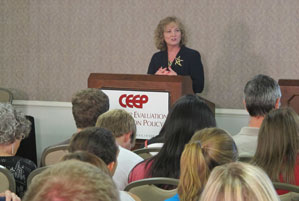Accountability, school grading, Common Core highlight CEEP Policy Chat with Ind. Schools Supt.
Glenda Ritz speaks along with president of Education Commission of the States
Attendees packed the Georgian Room at the Indiana Memorial Union on Monday, Sept. 9, 2013, to hear the vision for Indiana education laid out by the state’s superintendent of public instruction and insight on the national picture from the president of the Education Commission of the States. Glenda Ritz shared her experiences during her first eight months in office as Indiana schools superintendent during an Education Policy Chat presented by the Center for Evaluation & Education Policy (CEEP) at Indiana University.
Ritz was part of a program titled "DOE's Vision for Public Education in Indiana" along with Jeremy Anderson, the president of the Education Commission of the States, who served as discussant and Q-and-A session moderator.
Ritz told the audience she opposes labeling schools by an A-F grading system, the accountability system developed by her predecessor in office. That system has become the focus of state government re-evaluation following reports of manipulation. The superintendent said applying those grades to a school limits student possibilities upon graduation. “It has everything to do with labeling the children,” Ritz said. “There is nothing right about that.” She said that she supports accountability but wants a more fair and transparent system.
Ritz won a surprising victory in the November 2012 Indiana general election, defeating incumbent Indiana Superintendent Tony Bennett. Anderson, who became president of the Education Commission of the States late last year, will reflect on the Indiana education initiatives and compare and contrast them to education policy initiatives underway in other states.
The Education Commission of the States is a nationwide, nonpartisan organization that works directly with governors, legislators, chief state school officers, higher education officials and other leaders across all areas of education -- from pre-K to college and the workforce. The organization headquartered in Denver maintains a clearinghouse of education policy research and documents.
Anderson provided a statistical background for what Indiana and other states are doing in education evaluation and efforts to increase student performance. He discussed the ongoing controversy surrounding the Common Core standards, which have been passed in many states but are under fire by vocal opponents, including many in Indiana. Anderson noted that the Common Core discussion took place largely before 2009. When around 30 new governors came into office in 2010, many wanted to review the standards, holding up implementation.
You can see the complete discussion on the IU School of Education Vimeo Channel by clicking here.
CEEP, one of the country's leading nonpartisan education policy and program evaluation centers, promotes and supports rigorous evaluation and research primarily, but not exclusively, for educational, human services and nonprofit organizations. Center projects address state, national and international education questions. CEEP is part of the IU School of Education.
 Indiana Superintendent of Public Instruction Glenda Ritz speaking at the CEEP Policy Chat on Sept. 9, 2013
Indiana Superintendent of Public Instruction Glenda Ritz speaking at the CEEP Policy Chat on Sept. 9, 2013